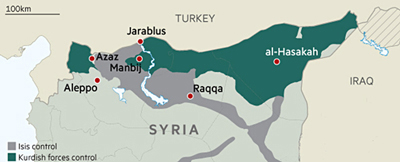
Vol. 80/No. 33 September 5, 2016
(lead article)
US-Turkish war moves in Syria seek to block Kurds

“Our forces began an operation against Daesh,” Turkish President Recep Tayyip Erdogan said, using a derogatory Arabic term for Islamic State, “and PYD [Kurdish Democratic Union Party] terror groups.”
Washington continues to seek some deal with Moscow and Tehran, as well as Ankara, that can defend its imperialist grip on the region. But conflicting national interests keep posing obstacles, and each aborted attempt leads to unforeseen shifts in the positions and alliances of the capitalist rulers involved. The one constant is that the impact on working people is catastrophic.
The U.S.-Turkish assault on Jarabulus began as Vice President Joe Biden arrived in Ankara.
He immediately announced Washington’s insistence the Kurds pull back and stay out of the area. “They must go back across the [Euphrates] River,” he said. “They cannot and will not, under no circumstances, get American support if they do not keep that commitment. Period.”
Biden is seeking to patch up relations with Turkish officials, who accused Washington of complicity in an attempted coup last month.
Biden’s demands mean U.S.-backed Syrian Democratic Forces — dominated by the Kurdish People’s Protection Units (YPG) — would have to leave the city of Manbij, south of Jarabulus, which they took from Islamic State last week. This had been the jihadist group’s main route to its remaining footholds on the Turkish border.
During the years of war, Kurdish forces have gained control of a large area along the Syrian-Turkish border, and proclaimed their autonomy in March. Whatever their conflicts on other questions, this is an unwelcome development for the ruling classes of Iran, Iraq, Syria and Turkey — all countries where the Kurds are an oppressed people.
Syrian gov’t shifts to attack Kurds
Over the last month, the Bashar al-Assad regime, Moscow and Ankara have made significant shifts in their positions. The Syrian dictator depends on Russian and Iranian military backing.Meanwhile, Erdogan has aided Islamist groups fighting against Assad, and views Tehran as a rival for influence in the region. But he has been seeking to mend ties with Moscow, meeting with Russian President Vladimir Putin Aug. 9. At the same time Erdogan’s government has been waging a war against the Kurdish population in southeastern Turkey.
Syrian government warplanes began bombing Kurdish-held areas for the first time Aug. 18, hitting parts of the northeastern city of Hasakah following days of clashes between Kurdish police and pro-Assad forces.
Until now there has largely been a de facto cease-fire between the Syrian government and the YPG, allowing Assad’s forces and their allies in Moscow and Tehran to focus their assaults against opposition forces.
Turkish Prime Minister Binali Yildirim hailed the bombing of Hasakah, telling reporters in Istanbul Aug. 20 that the Syrian “regime has understood the structure the Kurds are trying to form in the north [of Syria] has started to become a threat for Syria too.”
Yildirim also said Ankara is now willing to accept Assad remaining in power during a transitional period on the road to an end in hostilities.
The Assad government’s priority had been fighting opponents who were supported by Ankara, Ahmad Hisso Araj, a Kurdish spokesperson for the Syrian Democratic Forces, told the Wall Street Journal. Now there “is evidence of the Turkish-Syrian regime rapprochement,” he said.
Washington responded to Assad’s bombing of Hasakah with its own air patrols over the area. There are some 300 U.S. special operations troops there working with the YPG and other opponents of Assad fighting Islamic State. U.S. warplanes will “defend troops on the ground if threatened,” warned Pentagon spokesman Jeff Davis.
Mounting death toll
The civil war in Syria began in 2011 after the government crushed mobilizations of hundreds of thousands of people demanding political rights and an end to Assad’s regime. It has since become a multifront battleground.U.N. envoy Staffan de Mistura said in April some 400,000 people had died in the war, and the Syrian Observatory for Human Rights says nearly 5,000 died each month in May, June and July.
The eastern area of Aleppo, controlled by opponents of Assad, has been under siege for weeks, cutting off 300,000 residents from food and other supplies.
The fighting has also limited aid deliveries to 1.5 million people in government-controlled western Aleppo.
The Russian government has used the war in Syria to assert itself in the Mideast and to gain greater maneuvering room with Washington there, in eastern Europe and elsewhere.
Officials from Moscow’s defense ministry gloated Aug. 16 that Russian warplanes were carrying out bombing runs over Syria from an Iranian air base. This was the first time in decades Tehran has allowed foreign military operations to take place from Iranian soil. The decision provoked sharp opposition within Iran’s ruling class.
Five days later Iran’s Defense Minister Hossein Dehghan complained Moscow was “showing-off and inconsiderate” in publicizing the arrangement. The next day foreign ministry spokesman Bahram Ghasemi declared, “The operation was temporary and is over now.”
Related articles:
US, Turkish, Syrian hands off Kurds!
Endless Mideast wars: catastrophe for working people
Front page (for this issue) | Home | Text-version home